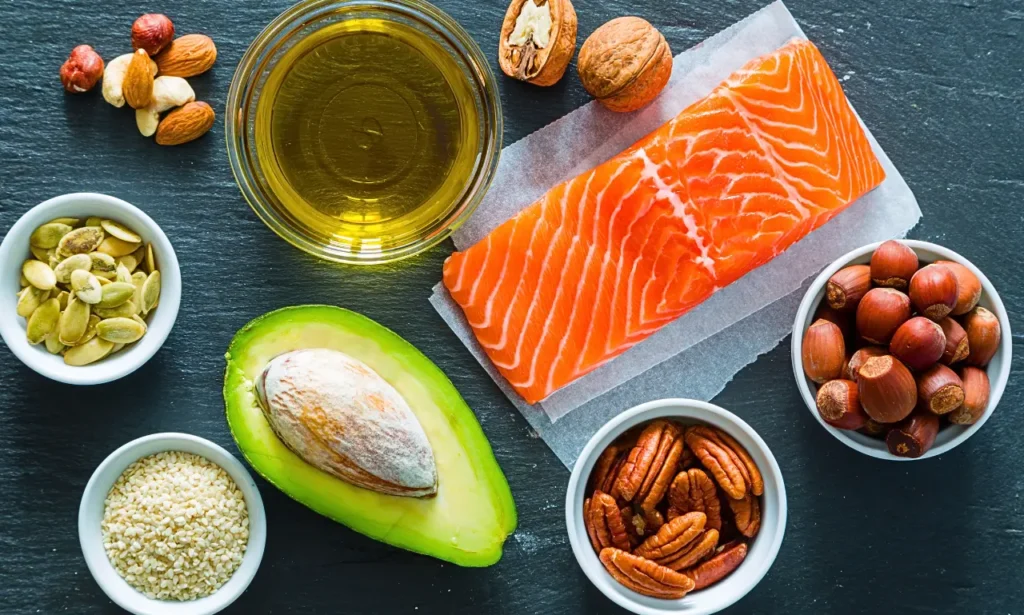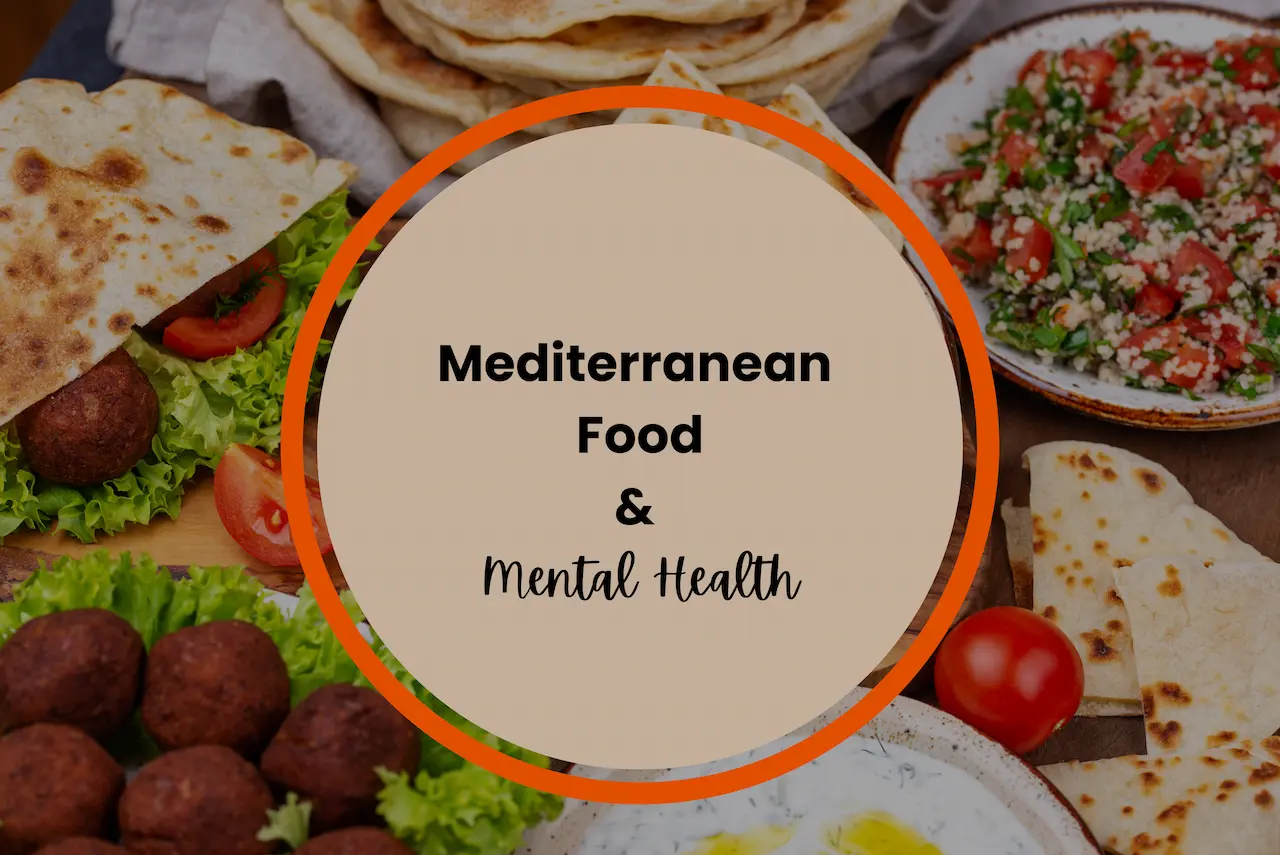Mediterranean Diet & Mental Health: The Mediterranean diet is celebrated not only for its delicious flavors but also for its profound health benefits, especially its positive impact on mental health. Rich in a diverse array of fruits, vegetables, whole grains, lean proteins, and healthy fats, this diet provides essential nutrients that support both the body and the brain. In this article, we examine the key components of the Mediterranean diet, their contributions to enhanced brain function and emotional well-being, and offer practical tips for incorporating these foods into your daily meals.
The Role of Fruits and Vegetables in Mental Health
Fruits and vegetables are foundational elements of the Mediterranean diet offering many health benefits.

Benefits of Fruits and Vegetables
Fruits and vegetables are rich in vitamins, minerals, and antioxidants, all of which are essential for maintaining good health. They also contain dietary fiber that aids in digestion. But did you know they’re great for your brain, too?
Impact on Mental Health
- Brain Protection: Antioxidants like vitamins C, E, and beta-carotene protect your brain cells from damage. This is super important because damage to brain cells can lead to problems with thinking and memory.
- Inflammation Reduction: Some mental health issues, like depression, are linked to inflammation in the body. Fruits and vegetables help reduce inflammation, which can make you feel better.
- Neurotransmitter Support: Minerals like potassium, found in many fruits and veggies, help your brain send messages, which is crucial for feeling good and thinking clearly.
Practical Recommendations
- Variety: Eat a colorful mix of fruits and vegetables. Each color offers different health benefits.
- Daily Intake: Aim to eat at least five servings of fruits and vegetables daily. For example, add berries to your breakfast, a salad to your lunch, and steamed or roasted veggies to your dinner.
Whole Grains for Steady Energy and Mood Regulation

Benefits of Whole Grains
Whole grains, such as quinoa, brown rice, and oats, contain complex carbohydrates and fiber. These provide a steady stream of energy without the sugar crash that can occur from consuming refined grains.
Impact on Mental Health
- Steady Glucose Supply: Whole grains provide a slow, steady release of glucose, which is essential for maintaining a well-functioning brain and a stable mood.
- B Vitamins: Whole grains are rich in B vitamins like folate, niacin, and thiamine. These vitamins help your brain produce neurotransmitters, which are chemicals that help control your mood and energy levels.
Practical Recommendations
- Incorporation: Add whole grains to your meals. You can also use them as a base for salads, side dishes, or even as the central part of your meal.
- Substitution: Whenever you can, swap out refined grains for whole grains. For example, use whole-grain bread instead of white bread and brown rice instead of white rice.
Lean Proteins for Mood Regulation and Cognitive Function

Benefits of Lean Proteins
Lean proteins supply amino acids, the building blocks of neurotransmitters like serotonin and dopamine. These neurotransmitters play a crucial role in regulating both mood and emotions. Additionally, proteins contribute to the production of norepinephrine, which enhances alertness and energy levels. Amino acids such as tryptophan, found in lean proteins like turkey and chicken, are directly linked to serotonin production, which helps maintain a positive mood and reduce anxiety.
Moreover, lean proteins support cognitive function by providing a steady supply of amino acids for brain repair and growth. Proteins also play a crucial role in maintaining stable blood sugar levels and preventing mood swings and irritability caused by fluctuations in glucose levels. Furthermore, omega-3 fatty acids found in fatty fish, as well as lean protein sources, have anti-inflammatory properties that protect against depression and cognitive decline. Consuming a variety of lean proteins ensures a balanced intake of essential amino acids, promoting overall mental health and well-being. mediterranean fruits vegetables.
Impact on Mental Health
- Mood Regulation: Eating enough protein ensures you have the amino acids needed to make neurotransmitters. For instance, tryptophan, found in lean proteins like turkey, helps produce serotonin, known as the “feel-good” chemical.
- Anti-Inflammatory Effects: Omega-3 fatty acids, found in fatty fish such as salmon, reduce inflammation and can surprisingly help alleviate symptoms of depression and anxiety for a mediterranean diet tips.
Practical Recommendations
- Regular Consumption: Eat lean proteins like fish, chicken, turkey, and legumes (like lentils and chickpeas) regularly. Try to eat fatty fish at least twice a week.
- Diverse Sources: Mix up your protein sources to get a variety of amino acids. Combining legumes with whole grains is a great way to get all the essential amino acids, especially if you’re a vegetarian.
Healthy Fats for Brain Health and Emotional Stability

Benefits of Healthy Fats
Healthy fats, especially monounsaturated fats and omega-3 fatty acids, are vital for the brain. They also maintain healthy brain cell membranes and facilitate communication between brain cells, which is essential for thinking, learning, and remembering.
Impact on Mental Health
- Cell Membrane Integrity: Healthy fats maintain the integrity of brain cell membranes, ensuring smooth communication between brain cells.
- Cognitive Function: Omega-3 fatty acids, particularly DHA, are crucial for memory and learning and also helps reduce the risk of cognitive decline.
- Emotional Stability: Healthy fats help stabilize your mood by supporting the production and function of neurotransmitters.
Practical Recommendations
- Primary Fat Sources: Use olive oil for cooking. It offers numerous health benefits due to its rich content of monounsaturated fats for a perfect mediterranean diet meal plan.
- Nut and Seed Inclusion: Do not only include nuts and seeds in your diet, but also walnuts, flaxseeds, and chia seeds because they are excellent sources of omega-3 fatty acids.
- Avocados and Fish: Incorporate avocados into salads and sandwiches, and include fatty fish like salmon, mackerel, and sardines in your diet regularly.
Herbs and Spices for Enhanced Brain Health

Benefits of Herbs and Spices
Herbs and spices not only enhance the taste of food but also offer numerous health benefits. For example, they can help reduce inflammation and have antioxidant properties that protect the brain.
Impact on Mental Health
- Brain Health: Herbs like turmeric contain curcumin, which can cross the blood-brain barrier and reduce inflammation and oxidative stress in the brain.
- Antidepressant Effects: Saffron has been found to boost mood by increasing levels of serotonin and other mood-regulating neurotransmitters.
- Enhanced Cognitive Function: Herbs like oregano and rosemary contain compounds that support memory and protect against brain diseases.
Practical Recommendations
- Regular Use: Add a variety of herbs and spices to your meals. For instance, turmeric can be added to soups, stews, and rice dishes. Saffron works well in rice and seafood dishes. Additionally, oregano and rosemary can be used to flavor meats, vegetables, and sauces.
- Experimentation: Try different herbs and spices until you see which ones you like best. This makes your food taste great and provides you with additional health benefits.
Conclusion
The Mediterranean diet is an excellent way to enhance your mental health, particularly when tailored to your lifestyle. It focuses on fruits, vegetables, whole grains, lean proteins, healthy fats, herbs, and spices. By incorporating these foods into your diet regularly, you can experience improved brain function, better mood regulation, and enhanced overall well-being. Embrace Mediterranean eating to support your mental health and live a happier, healthier life.
For more information and to explore Mediterranean cuisine, visit Aladdin’s To-Go Menu and Catering Menu. Embark on a journey to a healthier, happier you with the Mediterranean diet.
FAQs
- What is the Mediterranean diet? The Mediterranean diet is based on the traditional eating habits of countries near the Mediterranean Sea. It focuses on fruits, vegetables, whole grains, lean proteins, as well as healthy fats and moderate amounts of dairy.
- How does the Mediterranean diet benefit mental health? The Mediterranean diet provides essential nutrients that support brain health, reduce inflammation, and regulate neurotransmitters. These factors help improve mental well-being and also reduce the risk of depression.
- Can the Mediterranean diet help with depression? Studies show that following the Mediterranean diet is associated with a lower risk of depression, improved mental health, and a better mood, likely due to the nutrients in foods such as omega-3 fatty acids, antioxidants, and vitamins.
- What are some Mediterranean foods that help with depression? Fatty fish, leafy greens, nuts, seeds, berries, and legumes are rich in nutrients that support brain function and emotional stability.
- How can I start following the Mediterranean diet? Start by making small changes, such as eating more fruits and vegetables, choosing whole-grain options, and incorporating healthy fats. Then, plan balanced meals, cook at home, enjoy meals with others, and stay active.





